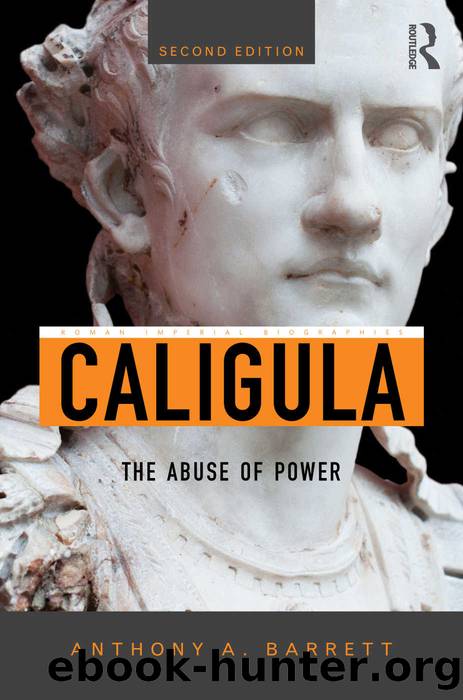Caligula: The Abuse of Power (Roman Imperial Biographies) by Anthony A. Barrett

Author:Anthony A. Barrett [Barrett, Anthony A.]
Language: eng
Format: azw3
ISBN: 9781317533900
Publisher: Taylor and Francis
Published: 2015-03-05T00:00:00+00:00
9
DIVINE HONOURS
Of all the manifestations of wild and extravagant behaviour exhibited by Caligula during his brief reign, nothing has better served to confirm the popular notion of his insanity than his apparent demand to be recognised as a god. Cruelty and incompetence may be unattractive traits of a ruthless despot, but they do not in themselves prove mental instability. A claim to divinity, however, seems inseparable from madness. The evidence for the supposed cult of Caligula in Rome is characteristically confused and incomplete, and must be evaluated with perhaps even more than the usual caution and scepticism. Most importantly, however, we must be careful not to impose on the ancient world our own preconceptions of what constitutes a sound and healthy relationship between the human and the divine.
Among the Romans, as among many people of antiquity, the distinction between man and god was not a sharp one. While this blurring is usually associated with the phenomenon of emperor worship in the imperial age, its origins go back to the republic. Thus Cicero could record his gratitude to Publius Lentulus by calling him parens ac deus (âparent and godâ), and Mucius Scaevola could say to Crassus te in dicendo semper putavi deum (âI have always thought you a god when you speakâ). It was thus well within the bounds of Roman tradition for Scribonius Largus to refer to Claudius as deus noster Caesar (âour god Caesarâ).1 In the Roman mind such expressions conveyed a recognition not so much of a divine being but of divine qualities that we normally associate with a god, but may in exceptional cases reside in fellow humans. In the eastern provinces especially, but by no means exclusively, this fine line was easily crossed. Many of the eastern peoples had long been accustomed to honouring their rulers with the tokens of divinity and to identifying them during their lifetimes quite explicitly as gods made manifest on earth. When Roman officials replaced these rulers, they in turn became the objects of worship. Thus, after Titus Flamininus defeated Philip of Macedon and proclaimed the liberation of Greece he began to receive homage from cities throughout the region, as did many Roman generals after him.2 Even Cicero had temples decreed for him in Asia, which he refused.3
The Roman emperor became the natural focus for such adoration, and Augustus was obliged to accommodate somehow those communities of the Greek east who expressed a desire to worship him during his lifetime. At the formal provincial level his official policy seems to have been to allow worship of himself only in conjunction with Rome, a practice that was transported to the west; the famous altar at Lyons, for instance, was dedicated to both Rome and Augustus.4 At the local level, however, he was not nearly so scrupulous, and cults of the emperor himself are found throughout the eastern communities, while members of the imperial family travelling in the east regularly received divine honours.5 This policy of restraint at the official level was maintained, as would be expected, by Tiberius.
Download
This site does not store any files on its server. We only index and link to content provided by other sites. Please contact the content providers to delete copyright contents if any and email us, we'll remove relevant links or contents immediately.
| France | Germany |
| Great Britain | Greece |
| Italy | Rome |
| Russia | Spain & Portugal |
Fanny Burney by Claire Harman(26602)
Empire of the Sikhs by Patwant Singh(23084)
Out of India by Michael Foss(16853)
Leonardo da Vinci by Walter Isaacson(13336)
Small Great Things by Jodi Picoult(7140)
The Six Wives Of Henry VIII (WOMEN IN HISTORY) by Fraser Antonia(5515)
The Wind in My Hair by Masih Alinejad(5095)
A Higher Loyalty: Truth, Lies, and Leadership by James Comey(4960)
The Crown by Robert Lacey(4814)
The Lonely City by Olivia Laing(4801)
Millionaire: The Philanderer, Gambler, and Duelist Who Invented Modern Finance by Janet Gleeson(4478)
The Iron Duke by The Iron Duke(4354)
Papillon (English) by Henri Charrière(4274)
Sticky Fingers by Joe Hagan(4198)
Joan of Arc by Mary Gordon(4109)
Alive: The Story of the Andes Survivors by Piers Paul Read(4031)
Stalin by Stephen Kotkin(3965)
Aleister Crowley: The Biography by Tobias Churton(3640)
Ants Among Elephants by Sujatha Gidla(3467)
